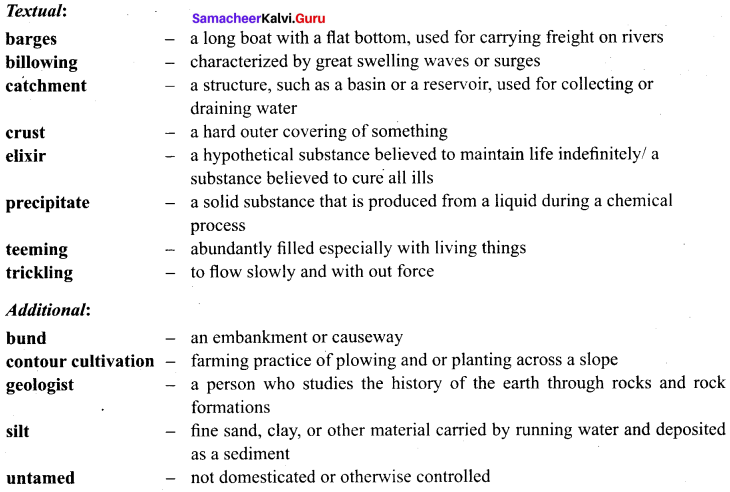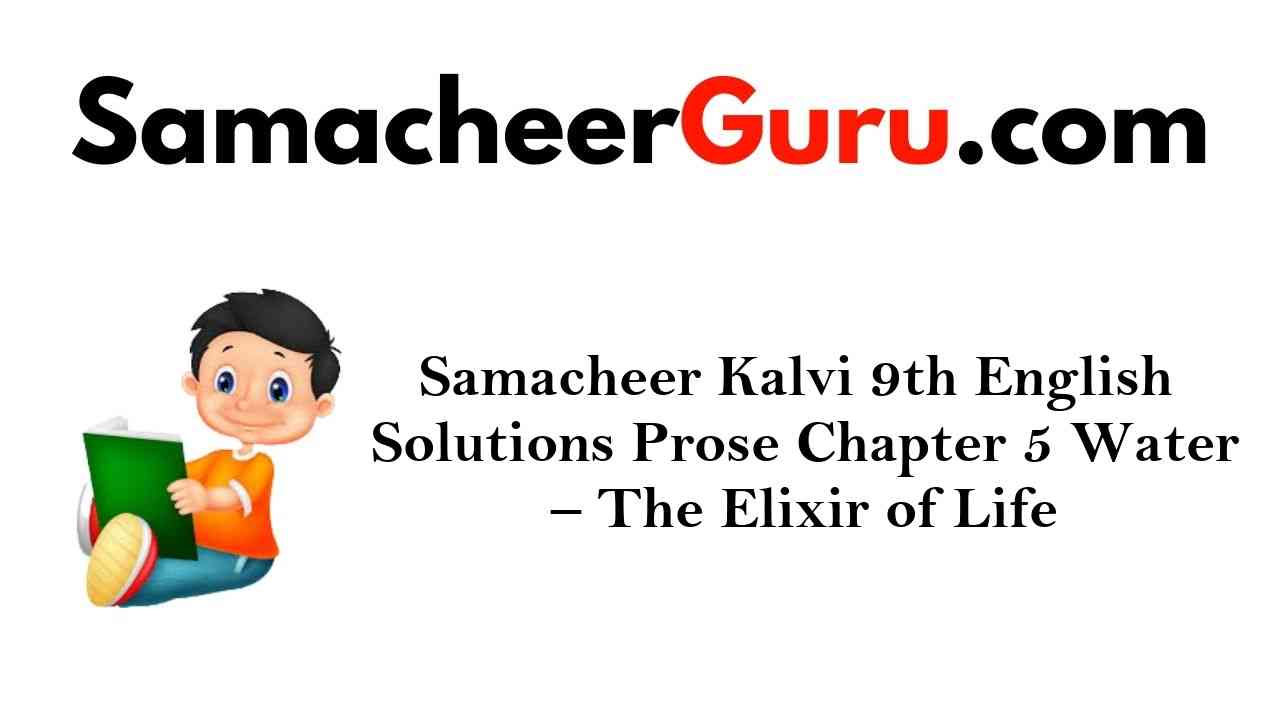You can Download Water – The Elixir of Life Questions and Answers, Summary, Activity, Notes, Samacheer Kalvi 9th English Book Solutions Guide Pdf Prose Chapter 5 help you to revise complete Tamilnadu State Board New Syllabus and score more marks in your examinations.
Tamilnadu Samacheer Kalvi 9th English Solutions Prose Chapter 5 Water – The Elixir of Life
Water – The Elixir of Life Warm Up:
Water The Elixir Of Life Questions And Answers Question 1.
Do you think the living organisms in this planet can survive without water? Why?
Answer:
No, because water is required by all living organisms in various processes for their survival.
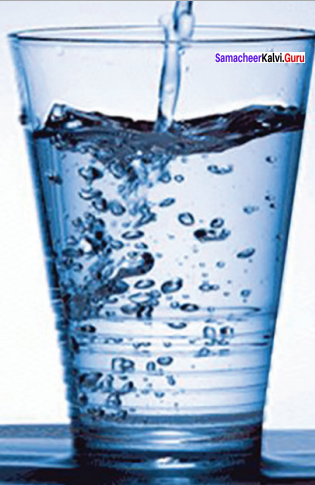
What Is The Imaginary Elixir Of Life 9th Standard Question 2.
Where do you get your drinking water from?
Answer:
I get drinking water from borewell and corporation pumps.
The Elixir Of Life Question And Answers Pdf Question 3.
Is the drinking water you use in your home treated?
Answer:
No, the drinking water we use is not treated.
The Elixir Of Life Lesson Questions And Answers Question 4.
If not, how do you purify it?
Answer:
Water is purified by filtration.
Water – The Elixir of Life Intext Questions
Water, The Elixir Of Life Notes Of Lesson Question 1.
What is the imaginary elixir of life?
Answer:
The divine Amrita is the imaginary elixir of life.
Summary Of Water The Elixir Of Life Question 2.
What according to the writer is the real elixir of life?
Answer:
According to the writer, water is the real elixir of life.
9th Std English Guide Pdf 2021 Question 3.
What is the ‘wonderful difference’ the writer talks about in the passage?
Answer:
On one side, was the visible sea of billowing sand without a speck of green or a single living thing anywhere on it. On the other side lay one of the greatest, most fertile and densely populated areas to be found anywhere on the earth, teeming with life and vegetation. This is the ‘wonderful difference’ that the writer talks about in the passage.
Question 4.
What is the ‘cheering sight’ mentioned in the paragraph?
Answer:
The rain fed tanks that are so common in South India are a cheering sight when they are full.
Question 5.
What does the writer compare water in a landscape to?
Answer:
The writer compares the water in a landscape to the eyes in a human face.
Question 6.
How does the water in rainfed tanks get its colour?
Answer:
The water in the rain fed tank carry slit or finely divided soil in suspension. This is the origin of the characteristic colour of the water in the rain fed tanks.
Question 7.
What is the main cause of soil erosion?
Answer:
The sudden burst of excessively heavy rain resulting in a large run of surplus water is the main cause of soil erosion.
Question 8.
What other factors add to the erosion of precious soil?
Answer:
The slope of land, removal of natural protective coat of vegetation, the existence of ruts along which the water can flow with rapidly gathering momentum and the absence of any checks of such flow are the other factors that add to the erosion of precious soil.
Question 9.
How can soil erosion be prevented?
Answer:
The terracing of land, construction of bunds to check the flow of water, the practice of contour cultivation and the planting of appropriate types of vegetation are the measures that can prevent soil erosion.
Question 10.
How does prevention of soil erosion serve a double purpose?
Answer:
The prevention of soil erosion would help to conserve and keep the water where it is wanted, in other words, on and in the soil. Thus it serves a double purpose.
Question 11.
What are the two sources of water?
Answer:
The two sources of water are rain and snowfall.
Question 12.
What happens to the rain water?
Answer:
The rain water flows down into the streams and rivers and ultimately finds its way to the sea.
Question 13.
What is the idea of civilized forest?
Answer:
The civilized forests would directly and indirectly prove a source of untold wealth to the country. They would check soil erosion and conserve the rainfall of the country from flowing away to waste and would provide the necessary supplies of cheap fuel, and thus render unnecessary the wasteful conversion of farmyard manure into a form of fuel.
Question 14.
How can you check soil erosion?
Answer:
The terracing of the land, the construction of bunds, the practice of contour cultivation and the planting of some types of vegetation are the measures that can be used to check soil erosion.
Question 15.
What is the cheapest means of transport?
Answer:
The cheapest means of transport is by boats and barges through canals and rivers.
Question 16.
How can you make a difference in the countryside?
Answer:
The availability of electric power would make a tremendous difference to the life of the countryside and enable rural economy to be improved in various directions.
Water – The Elixir of Life Textual Questions
A. Answer the following questions briefly in one or two sentences.
Question 1.
What makes water one of the most powerful and wonderful things on earth?
Answer:
Water played a role of vast significance in shaping the course of the earth’s history and continues to play the leading role in the drama of life on the surface of our planet.
Question 2.
How does water help in the formation of fertile lands?
Answer:
The water has its power to carry slit or finely divided soil in suspension. The great tracts of land formed by slit thus deposited is evident on an examination of the soil in alluvial areas. Thus, water helps in the formation of fertile lands.
Question 3.
How does soil erosion happen and what are its main causes?
Answer:
The flow of water under certain conditions causes soil erosion. Sudden bursts of excessively heavy rain resulting in large run of surplus water are the principal factors in causing soil erosion.
Question 4.
What are some measures that are used to prevent soil erosion?
Answer:
The terracing of land and construction of bunds to check the flow of water, the practice of contour cultivation and the planting of appropriate types of vegetation are few measures to check erosion.
Question 5.
How, according to Sir C. V. Raman, can rainwater as well as the water of rivers be, prevented from going to waste?
Answer:
The systematic planting of suitable trees can prevent rainwater going to waste.
Additional Questions
Question 1.
How will development of hydro-electric power be a resource?
Answer:
Development of hydro-electric power will enable tapping of underground water which requires electricity and thus overcome the inadequacies of other sources of water.
Question 2.
What is far from an exhausted field of research?
Answer:
The investigation of nature and properties of water is considered the highest scientific interest and is far from an exhausted field of research.
Question 3.
When and where did the author notice not a single living being?
Answer:
The author noticed not a single living being while standing on the line which separated the Libyan Desert from the Valley of the Nile in Egypt. The desert was without a speck of green.
Question 4.
How is the Nile valley soil created?
Answer:
Nile valley soil is created by the river itself. It is brought down as the finest silt in its flood waters, from the highlands of Abyssinia and from remote Central Africa. It is laid down through the ages in the trough through which the Nile flows into the sea.
Question 5.
How is the great tracts of land formed by deposition of silt evident on an examination of the soil in alluvial areas?
Answer:
Great tracts of land formed by silt deposition is evident on an examination of the soil in alluvial areas. When silt-laden water mixes with the salt water of the sea, there is rapid precipitation of the suspended matter. The colour of the water changes successively from red or brown shades of silt through varying shades of yellow and green before it becomes blue of the deep sea.
Question 6.
Why is physiological activity impossible where fluid does not play an important role?
Answer:
Water is the elixir of all life. Even fauna and flora contains a considerable proportion of free or combined water in its body. Hence, physiological activity is impossible where the fluid does not play an important role.
Question 7.
State the national problem which must be considered and dealt with on national lines.
Answer:
Water conservation is the national problem which must be considered and dealt with on national lines. Unbelievably, large quantities of the precious fluid are not conserved. Our rivers, mostly run to waste and harnessing it is vital.
B. Answer the following in about 80-100 words.
Question 1.
How does C.V. Raman show that water Is the real elixir of life?
Answer:
Raman tries to bring about the importance of water, which has a unique power of maintaining animal and plant life. Water, the elixir of life, is the commonest of all liquids. Without water the land will be barren like the deserts in Egypt. On one side it is a sea of sand. On the other side laid one of the greatest, most fertile, densely populated areas the valley of Nile.
It is separated by the river Nile flowing down thousands of miles away. The entire soil is the creation of river Nile. Egypt, in fact was made by its river. Water is the basis of all life. Every animal and plant contains water in its body. Water is essential for the body, moisture in the soil is equally important for the life and growth of plants and trees. The conservation and utilization of water is fundamental for human welfare.
Question 2.
Water exists in all plant and animal forms – Explain.
Answer:
If there is plenty of water and abundant rainfall, there will be good growth of plants. The population of animals depending on these plants will increase. On the other hand, if there is a drought, there will be a smaller supply of plants. The animals depending on these plants will decrease in population as a result of the decrease in the plant population. Water is the fundamental necessity for both animal and plant forms.
Question 3.
Life cannot exist on earth without water – Explain.
Answer:
Water is the basis of all life. Every animal and plant contains water in its body. Water is essential for the body, moisture in the soil is equally important for the life and growth of plants and trees. The conservation and utilization of water is fundamental for human welfare. Much of Indian agriculture depends on monsoon.
It is clear that the adoption of techniques preventing soil erosion would help to conserve and keep the water where it is wanted. Without water, nothing is possible on earth. The collection of rain water and utilizing them is very important. Vast areas of land which at present are scrub jungle could be turned into fertile and prosperous country by courageous and well-planned action.
Additional:
Question 1.
How is Artesian Water Created?
Answer:
Springs become artesian when the water flows to the surface under natural pressure without pumping. Water flows down a decline into a porous substance such as rock, sand or gravel. The hard rock surrounding the porous substance prevents water to escape through it. In some places the overlying impermeable rocks are broken by joints or faults. A pressure starts building up between two impermeable surfaces. The water underneath is forced out by this pressure and it may escape through the faults to rise to the surface. Most of the times the escape is a well, which becomes the source of the artesian water.
C. Given below are some idioms related to water. Match the idioms with its meaning.
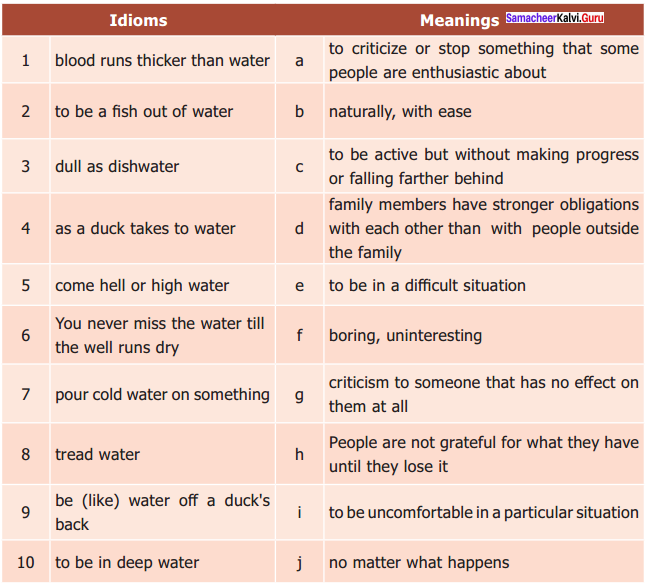
Answers:
1. (d), 2. (i), 3. (f), 4. (b), 5. (j), 6. (h), 7. (a), 8. (c), 9. (g), 10. (e).
D. Water is a scarce resource. Discuss the causes, problems and solutions to water scarcity and write them below.
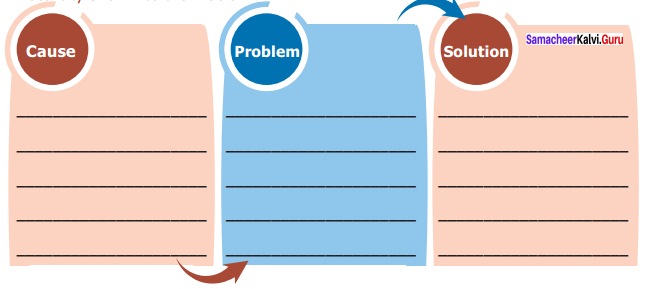
Causes :
Conflict: A conflict over an area of land may make it difficult to access the water located there.
Distance: Many areas face water scarcity because they aren’t close to any source of water.
Drought: Some areas do not get enough rainfall to be able to sustain life.
Overuse of Water: The overuse of water on people, animals, land, or recreational activities can cause water scarcity.
Pollution: Water might get polluted by anything from oil, to carcasses, to chemicals, and to fecal matter.
Problems:
Diseases: If we don’t have clean water access, we will be more likely to get diseases.
Hunger: Due to shortage of water, agricultural lands will not be watered properly. This may cause crop deficiency and people and animals will have to go hungry.
Lack of Drinking Water: The worst outcome of water scarcity is non-availability of clean drinking water.
Lack of Education: Children might be too sick to even go to school.
Sanitation Issues: Absence of clean water makes it difficult to clean food, dishes, or even to take a bath.
Solutions:
Technology: New and modem methods of water conservation can be applied.
Education: By educating people about water scarcity, we can prevent the problem from becoming worse in the future.
Improved Farming: We must think of farming and irrigation techniques that don’t use much water.
Recycle Water: We can recycle rainwater and use it in factories and homes.
Support Clean Water Initiatives: We can fund such organizations which bring clean water to areas that don’t have it.
Listening:
E. On the basis of the listening passage, choose the correct answer from the given options.
Question 1.
Severn Suzuki represents an organization called ECO which stands for _________.
(a) Ecological Cooperation.
(b) Environmental Coordinating Organization.
(c) Environmental Children’s Organization.
(d) Ecological Children’s Organization.
Answer:
(c) Environmental Children’s Organization
Question 2.
“I am fighting for my future.” The ‘fight’ refers to her ________.
(a) fight to win an election.
(b) fight to gain a few points in share market.
(c) fight against corruption.
(d) fight against environmental pollution.
Answer:
(d) fight against environmental pollution
Question 3.
Animals and fish are becoming extinct because ___________.
(a) they have no place to go.
(b) they die of diseases.
(c) their food and habitat are polluted.
(d) all the above.
Answer:
(d) all the above.
Question 4.
It is evident that Severn Suzuki is concerned about all other species too as,____________.
(a) she considers them all belonging to one world.
(b) they have nobody except her to speak for.
(c) they belong to her.
(d) they are all children.
Answer:
(a) she considers them all belonging to one world
Question 5.
Severn Suzuki condemns the people of her country for ____________.
(a) contributing large amounts of waste and not sharing the excess with the needy.
(b) being afraid of the poor.
(c) being angry with the poor belonging to other countries.
(d) being wealthy.
Answer:
(a) contributing large amounts of waste and not sharing the excess with the needy
Question 6.
Which of the following statements is not true? __________________.
(a) Canada is a rich country and people have in plenty.
(b) Canadian children are privileged.
(c) A Brazilian child was willing to share because she was rich.
(d) Northern countries will not share with the needy
Answer:
(c) Canada is a rich country and people have in plenty
F. Answer the following questions briefly.
Question 1.
What is the humb
le request of the twelve- year -old to the elders?
Answer:
She requests adults to change their ways and save nature for the future.
Question 2.
The dream of Severn Suzuki is
Answer:
She has dreamt of seeing the great herds of wild animals, jungles and rain forests, full of birds and butterflies.
Question 3.
The fear and agony of Severn Suzuki is
Answer:
We make so much waste.
Question 4.
How does she proclaim that she represents the future generation?
Answer:
She calls herself as one of the children starving in Somalia or a victim of war in the Middle East or a beggar in India.
Question 5.
The duties and responsibilities of the parents are
(a) to comfort their children saying that everything will be all right.
(b) _____________.
(c) _____________.
Answer:
(b) To teach children to respect others.
(c) To clean up their mess and not to hurt other creatures.
Speaking:
G. You are the President of CO GREEN, the Environment Club of your school. On the occasion of World Environment Day, you have been asked to address the school on the topic, ‘The Nature of Our Future Depends on the Future of Our Nature’
Answer:
Good morning, esteemed Chief Guest, the Head Master, teachers, dear friends and invitees. I am Shobha, Secretary of GO GREEN, the Environment Club of our school. Today, I stand before you to share my views on the topic “Stopping pollution is the best solution”. We humans have always deceived ourselves by thinking that someone else will save our planet.
Can you imagine… for the past 200 years we have been conquering nature, and now we are beating it to death by constantly polluting it. The Earth is not dying, it is being killed and the people who are killing it have names and addresses. All the human actions in this modem world directly impact the whole ecosystem. Industrial emissions, poor disposal of wastes, mining, deforestation, use of fossil fuels and agricultural activities, ultimately harm the nature which is the sole provider of pure oxygen, food and other requirements of man and animal.
Animals are becoming extinct. There are newer diseases evolving for which diagnosis has become impossible and so takes longer time to find a cure. Due to pollution, the number of various chemical elements is increasing in the atmosphere which ultimately causes irregular rainfall and global warming. Who is responsible? It is time we start thinking and doing our bit to be conservative and eco-friendly.
Let us walk or cycle to our work places/school. Let us not use plastic bags. Let us all keep our surroundings clean and plant at least one tree. As quoted by Lady Bird Johnson, “The Environment is Where we all meet; Where we all have a Mutual Interest; It is the one thing we all Share”. So, let’s be eco-friendly and go green. Thank you. Have a good day.
H. A class of super heroes:
‘CHANGE IS NEEDED, AND IT IS NEEDED NOW’. Let’s meet a class of superheroes who have taken simple sustainability projects upon themsleves to trackles the envirionmental problems in their campus.
Grammar:
Simple present tense
A. Choose the correct form of the present tense verb from the options given.
- All children something new every day. (learn / learns / learned)
- A good student always hard, (work / works / worked)
- Engineers bridges, (build / builds / built)
- My sister is an architect. She skyscrapers. (design / designs / designed)
- The Himalayas India from the cold winds. (protect / protects / protected)
- It always here in the afternoon, (drizzle / drizzles / drizzled)
- My mother in a factory, (work / works / worked)
- Chella English very well, but she doesn’t understand Hindi. (speak / speaks / spoke)
- Cows us milk, (give / gives/ gave)
- The trains to Chennai always on time, (run / runs / ran)
Answer:
- learn
- works
- build
- designs
- protect
- drizzles
- works
- speaks
- give
- run
Present Continuous Tense:
B. Make sentences in the present continuous tense using the verb given in brackets.
- Who is that boy _________ on the table? (stand)
- What are you _______? (do) I ________ (listen) to music.
- My brother _________ (work) in London now.
- I ________ (wait) for my mother.
- It is better not to disturb her, she ___________ (work).
Answer:
- standing
- doing, am listening
- is working
- am waiting
- is working
C. What are they doing? Use the verbs below and write sentences.
eat, cry, play, read, sing, watch.
Answer:
- Anu is singing.
- Peter is watching.
- Sudhan is playing.
- Velu is reading.
- Kalai is crying.
D. Look at the picture again and answer the questions.
- Is Tom reading? __________.
- Is Velu eating? _____________.
- Is Kalai dancing? _____________.
- Is Peter watching TV? _____________.
- Is Anu crying? _____________.
Answer:
- No, Tom is eating
- No, Velu is reading
- No, Kalai is crying
- No, Peter is watching through a telescope
- No, Anu is singing
E. Write the -ing form of the verbs.
- Come _____________.
- Take _____________.
- Fly _____________.
- Swim _____________.
- Study _____________.
- Read _____________.
Answer:
- Coming
- Taking
- Flying
- Swimming
- Studying
- Reading
F. Write negative sentences.
- He is learning to read.
- I am having a bath.
- I’m reading a fantastic book.
- Raja is driving a new car.
- I’m looking for my bag.
Answer:
- No, he isn’t learning to read.
- No, I am not having a bath.
- No, I am not reading a fantastic book.
- No, Raju isn’t driving a new car.
- No, I am not looking for my bag.
G. Write questions for the answers.
1. _________________?
No, they aren’t singing.
Answer:
Are they singing?
2. _________________?
Yes, She is writing a new book.
Answer:
Is she writing a new book?
3. _________________?
Yes, It is working.
Answer:
Is it working?
4. _________________?
No, he isn’t doing the project.
Answer:
Is he doing the project?
5. _________________?
Yes, We are planning to go.
Answer:
Are we planning to go?
H. Fill in the blanks with verbs in the present continuous.
- You (listen) to the music.
- He (cry).
- I (swim) in the pool.
- Latha (wait) for her daughter.
- she (watch) TV?
- Who he (help)?
- Her father (not / cook) dinner.
- Akila Y, (not /sing) a song.
- My brother (not / do) his homework.
- your mother (work) today?
- Amutha and Praba (play) tennis.
- Amith and Ravi (not / swim) in the lake.
Answer:
- are listening
- is crying
- am swimming
- is waiting
- is, watching
- is, helping
- is not cooking the
- is not singing
- is not doing
- is, working
- are playing
- are not swimming
Present Perfect Tense:
I. Make sentences in the present perfect tense using the verbs in brackets.
1. She to _______________ anybody, (never apologized, has never apologized, have never apologized)
Answer:
has never apologized
2. My mother to _______________ London, (has been, being in, have been)
Answer:
has been
3. I _______________ all the plays of Shakespeare, (read, had read, have read)
Answer:
have read
4. Have you _______________ your lunch? (finish, finished, had finished)
Answer:
finished
5. _______________ he brought his bike? (Had, Has, Have)
Answer:
has
Present perfect with “ever and never”
J. Have you ever…?
Question:
Have you ever eaten a kiwi fruit?
Answer:
Yes, I have eaten a kiwi fruit.
Or No, I have never eaten a kiwi fruit.
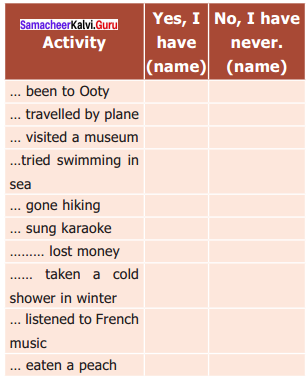
Answer:
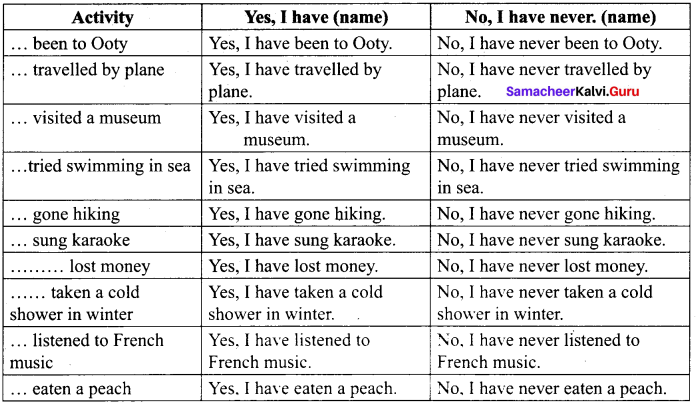
Present perfect continuous tense:
K. Make sentences in the present perfect continuous tense using the verbs in brackets.
1. How long _______________ ? (are you waiting, have you been waiting, have you waited)
Answer:
have you been waiting
2. She _______________ in the garden since morning, (is working, has been working, work)
Answer:
has been working
3. I _______________ this mobile for three years, (am using, has used, have been using)
Answer:
have been using
4. The children _______________ in the park, (has been playing, have been playing, had been playing)
Answer:
have been playing
5. The workers _______________ higher wages for a long time, (has been demanding, have been demanding, demand)
Answer:
have been demanding
Simple Past Tense:
L. Complete the story using the past tense of the verbs.
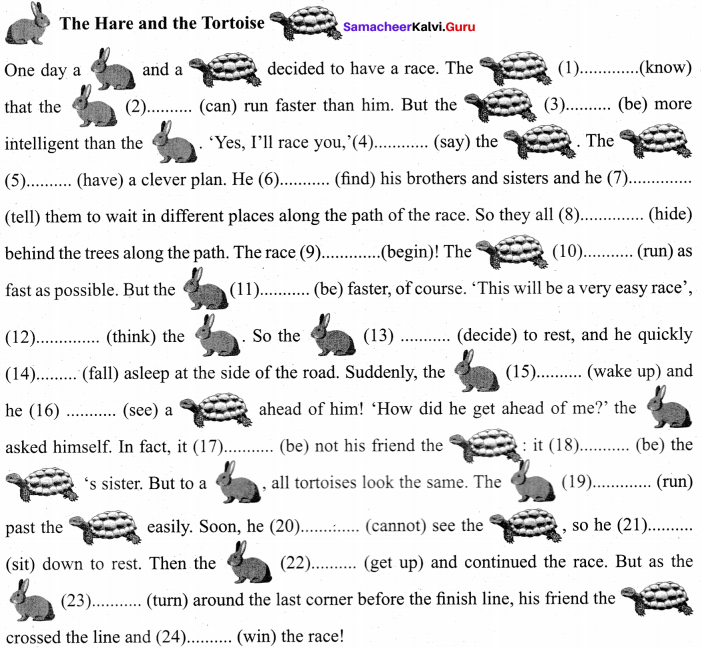
Answer:
- Knew
- could
- was
- said
- had
- found
- told
- hid
- began
- ran
- was
- thought
- decided
- fell
- woke up
- saw
- was
- was
- ran
- couldn’t
- sat
- got up
- turned
- won
M. Finish each clue by changing the verb within brackets to an irregular past-tense verb.Then complete the crossword puzzle.
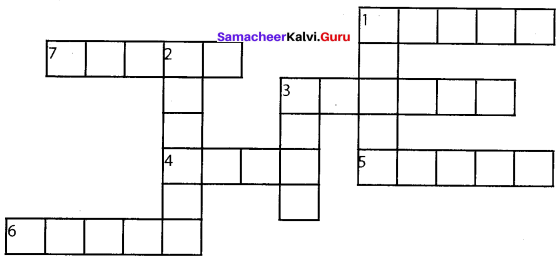
Across:
- The lake (freeze) ………. overnight.
- Hema (buy) ………. a new bicycle.
- Aravind (give) ………. me a slice of pizza.
- We (drink) ……….. milk.
- The dog (sleep) ………… on the sofa.
- He (write) …………… a letter to his cousin in America.
Down:
- I (find) ………… a coin on the ground.
- Tony (teach) …………. his cat to use the litter box.
- Selvi (blow) ……….. out the candle.
Answers:
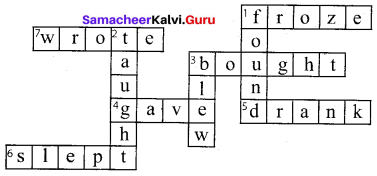
Past Continuous Tense:
N. Make sentences in the past continuous tense using the verb in brackets.
1. The children _________ (wait) for the bus.
Answer:
were waiting
2. The girls __________ (leam) their lessons.
Answer:
were learning
3. I ____________ (play) in the rain all evening.
Answer:
was playing
4. Vijay ____________. (repair) his car.
Answer:
was repairing
5. Hari ____________ (work) hard to pass the entrance
Answer:
was working
Past Perfect Tense:
O. Complete the sentences using the past perfect tense.
- Kalai didn’t complete his homework because ……………… .
- By the time Sundar got up ………….. .
- When we reached the park,…………. .
- Saralah didn’t want to see her …………. .
- Manohar was laughing because ………….. .
Answers:
- he had slept
- his brother had gone for work
- our friend had already reached
- brother, though her brother had hoped the same
- he had smelt the laughing gas
Past Perfect Continuous Tense:
P. Circle the correct verb form in each of the following sentences.
- Ezhil baked / had been baking a cake when they came.
- Veeran cleaned/ had been cleaning the room since morning.
- We worked / had been working in the city for ten years before we moved to the village.
- The cat had been waiting/was waiting for the mice to come out of its hole.
- Kannan had been looking/ have been looking for a job for a long time.
Answers:
- had been baking
- had been cleaning
- had been working
- had been waiting
- had been looking
Simple Future Tense:
Q. Complete the sentences using the correct form of the verbs in brackets.
- We hope you …………. (have) a great time in Ooty.
- I think Manju ……………. (visit) her grandparents during the vacation.
- Be careful, that mirror ……………. (fall) on the floor.
- As soon as my father arrives, we …………….(go) to watch the film.
- When your train arrives, I …………….. (wait) for you at the station.
Answers:
- will have
- will visit
- will fall
- will go
- will wait
Future Continuous Tense:
R. Make sentences in the future continuous tense using the verb in brackets.
- Ashwin …………. (complete) M.B.A.in another two years.
- I …………….. (go) to Thanjavur by this time tomorrow.
- Prabha ……………(receive) the best student award in six months’ time.
- The plane ……………… (leave) at 3 o’clock.
- He …………… (attend) the conference.
Answers:
- will be completing
- will be going
- will be receiving
- will be leaving
- will be attending
S. What is Amala going to do? Given below is Amala’s schedule for next week. Read it and answer the questions using the future continuous tense.
Amala’s Schedule

Question 1.
What will Amala do on Sunday morning?
Answer:
She will be visiting her grand mother.
Question 2.
What is Amala planning to do on Saturday afternoon?
Answer:
She will be preparing sweets.
Question 3.
Where is Amala going on Wednesday morning?
Answer:
Amala will be going to the library to return the books.
Question 4.
Who is Amala meeting on Tuesday morning?
Answer:
Amala will be meeting her friends.
Question 5.
What will she buy on Monday afternoon?
Answer:
Amala will be buying groceries for the week.
Future Perfect Tense:
T. Match words from the different columns to make reasonable predictions. Then write them down in the space below. One has been done as an example.
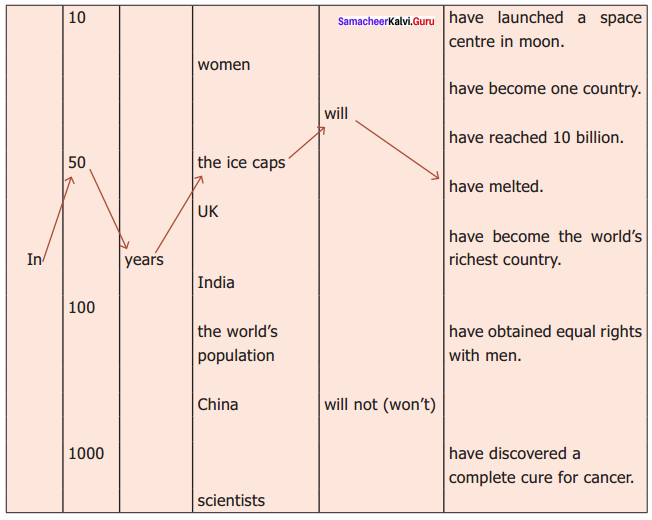
Write the sentences:
- In 50 years the ice cap will have melted.
- …………………………………………………………
- …………………………………………………………
- …………………………………………………………
- …………………………………………………………
- …………………………………………………………
- …………………………………………………………
Answers:
- In 50 years the ice cap will have melted.
- In 10 years, the world’s population will have reached 10 billion
- In 50 years, India will have become the world’s richest country.
- In 10 years, women will have obtained equal rights with men.
- In 10 years, Scientists will have discovered a complete cure for cancer.
- In 50 years, India will have launched a space centre in moon.
- In 50 years, U.K. will have become one country.
Water – The Elixir of Life About The Author:
Sir Chandrasekhara Venkata Raman (1888-1970) was an Indian physicist bom in Tiruchirappalli. In 1904, he stood first and won the gold medal in physics in the Bachelor of Arts examination of University of Madras. He carried out ground-breaking work in the field of light scattering, which earned him the 1930 Nobel Prize for Physics. He discovered changes in wavelength of some of the deflected light when light traverses a transparent material. This phenomenon, subsequently known as Raman Scattering, results from the Raman effect. To commemorate it, February 28th is celebrated as the National Science Day. In 1954, India honoured him with its highest civilian award, the Bharat Ratna.
Water – The Elixir of Life Summary:
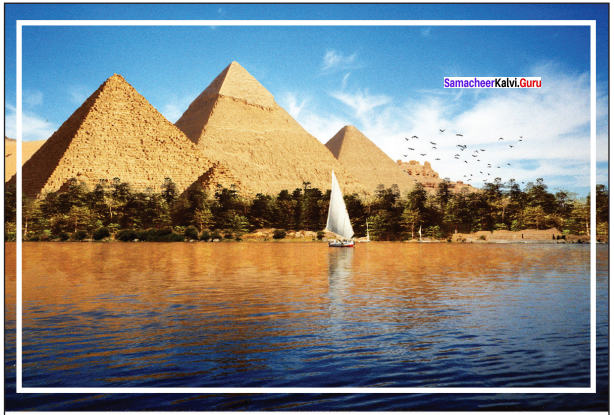
Since ages man has sought in vain for an imaginery elixir of life – the divine Amrita which confers immortality. But in reality the true elixir is the water that is freely available. The author remembers once standing on the line that separates Libyan Desert from the valley of the Nile. He could observe a wonderful difference between the desert where there was no life to be seen. On the other side, due to the presence of river Nile the valley has become the most fertile and densely populated land on earth. Geologists explain that this fertility is totally attributed to the river Nile, which flows from the highlands and from remote Central Africa. The Egyptian civilization is sustained by the waters that flow from Nile river.
Water, which we take for granted in our everyday lives, has played a vital role in shaping the course of Earth’s history and continues to do so. Moreover, it adds so much to the beauty of the countryside, such as the streams or ponds and so on. The rainfed tanks are so common in South India and its sad to see its neglected maintenance, though it is a cheering site when they are full. South Indian agriculture is completely dependent on these tanks. Some of these tanks are large enough so that the sun rise or set can be seen over one of them. Water in a landscape may be compared to the eyes in a human face, which reflects the mood of the hour, being bright and gay during the day and turns dark and gloomy when the sky is overcast.
Water has the remarkable feature of carrying silt or finely divided soil in suspension which contributes to the characteristic colour of the water in rainfed tanks. Swiftly flowing water can carry fairly large and heavy particles. These particles are deposited on the areas they flow and settle. The variation in the different layers of soil can be seen in alluvial areas. Such lands are usually very fertile. The flow of water thus has played an important role in shaping the earth. On the contrary it has led to soil erosion which led to heavy loss in agriculture especially in many parts of India.
Soil erosion occurs in successive steps being unnoticed in,the early stages and later forming deep gullies and ravines which make all agriculture impossible. Heavy rains are the prime reason for soil erosion, others include; slope of the land, removal of the natural protective coat of vegetation, the existence of ruts. It calls for urgent prevention measures which includes; terracing of land, construction of bunds, practice of contour cultivation and the planting of appropriate types of vegetation.
In a country like India, such measures has to be taken as they completely depend on seasonal rainfall. Water forms the basis of all life. Every animal or plant requires water for all kinds of physiological activities. In India, afforestation has to be checked and planting of suitable trees in every possible area, and the development of what one can call civilized forests, as distinguished from wild and untamed jungle should be carried out. Such plantation would directly and indirectly prove a source of untold wealth to the country.
Water – The Elixir of Life Glossary:
